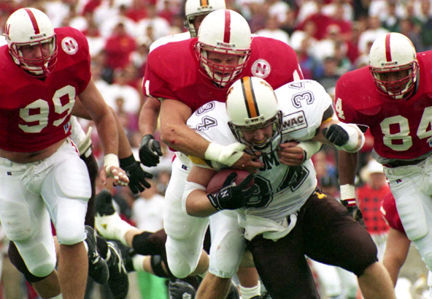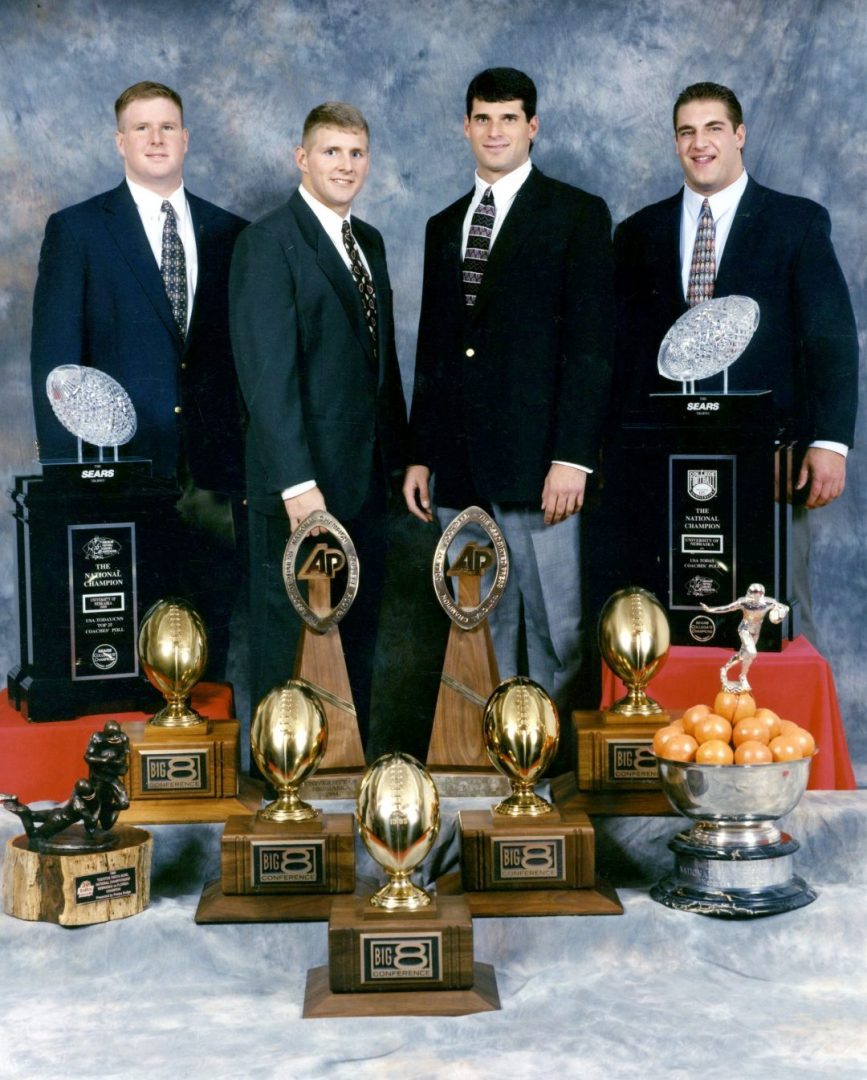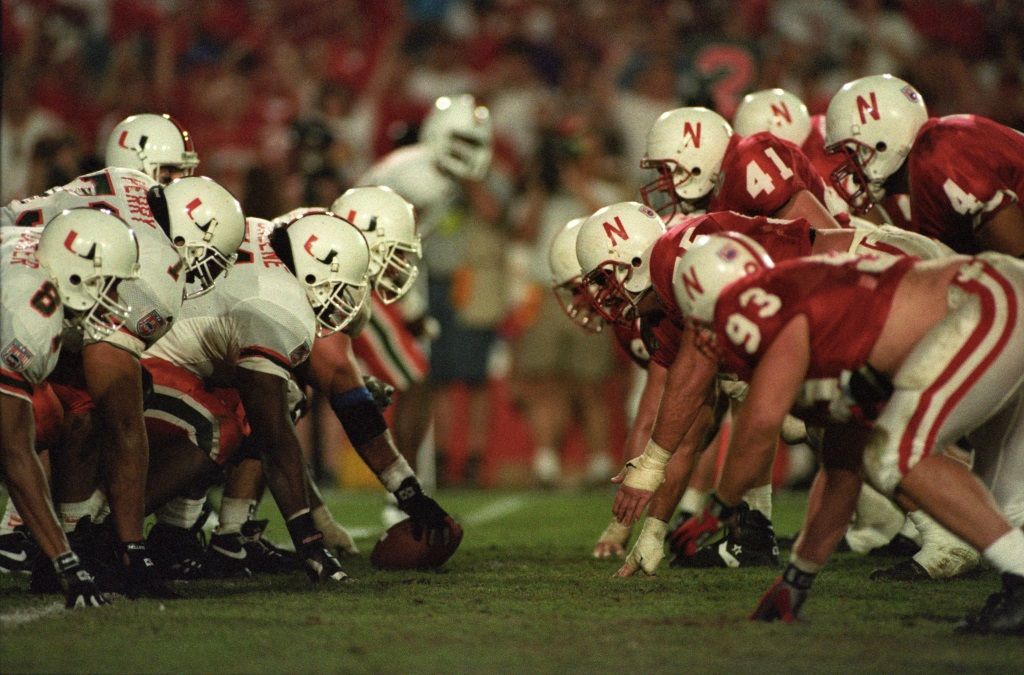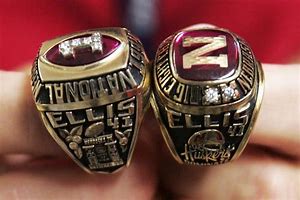Anatomy of an Era: Phil Ellis, Part 2

Excerpted from Chapter 62, No Place Like Nebraska: Anatomy of an Era, Vol. 2 by Paul Koch
Anatomy of an Era: Phil Ellis, Part 2
Q: Phil, I’m of the mindset that many people just expected -for lack of a better term- expected you guys to run out there on Saturdays and dominate and win, yet don’t have an adequate understanding or true appreciation for all the work and effort that took place all of the other days of the week behind the scenes. Can you give me an idea of what took place when no one was watching?
Phil Ellis: You know: school. With Coach Osborne it was always school first. And I’ve talked to other college players and they were, “School? What!?” (laughs) So that was different in that school was always the number one goal for anybody; you always had to get your schoolwork done and have good grades.
And you know this, but a typical day for me was: you’d start class at 7:30, 8 o’clock in the morning and have three or four classes and be done by noon. Whereas the typical college student would wake up by 10:30, 11, have maybe two classes and then, “Where am I drinking, partying, whatever?” We’re practicing. So you’d get up at 6 a.m. and then get home at 9 at night. And that was every day. It was a full-time job. And we weren’t spoiled. But we had resources, you could say, to help us get better. We were there a lot. It was hard to balance your life with everything.
And coach’s practices were always fun. You were full pads for two days and half pads another day. And not to take anything away from people, but when you’re practicing number one offense versus the number one defense in the country, come Saturday things really slow down for you. (laughs)

Aaron Graham, Phil Ellis, Brook Berringer & Christian Peter
Q: And when you guys did go out to drink it would be to blow off some steam, maybe Saturday after the game?
PE: Oh yeah, you’d go out and have a good time. I had a serious girlfriend the whole time (who’s my wife now), but you’d have a little bit of college life. (laughs)
Q: I guess my point is that a lot of folks may not fully appreciate the level of rigor, of discipline, that it took…
PE: I guess ‘discipline’ is a good word for it. It was time-consuming. And like you said, everyone thinks you show up and have a couple practices and you’re automatically good, but it’s hours of paperwork and you get in there and watch film with the coaches. And again, it’s a big business now: you put time in and you get ’r done.
Q: Right, so you had film work, a big team meeting, then a position meeting, then practice after that, then weight lifting, then the training room, then eating at the training table and study hall after that?
PE: Oh yeah, I was a biology major. I graduated with a biology major, so that was a lot of fun. I had the whole gamut of chemistry and all that stuff.
Q: So you had VD? Professor Victor Day?
PE: Oh yeah, he was a good guy.
Q: So after all is said and done, were all the sacrifices and efforts expended worth it?
PE: Oh God, yeah. I wouldn’t change anything. It was unbelievable. How many guys can say, “Yeah, I’m a five time Big 8 and two time national champion? “(laughs) Not too many people.
It’s unbelievable the people you meet, and Coach Osborne was just a bonus out of all the bonuses. Actually, let me take that back: the Big 8’s and the championships were the bonus, because it was all about being around Coach Osborne and just the legend that he is, just unbelievable.
Q: What memories of him stick with you the most?
PE: Well, the one thing that really sticks out was ’95: me and Doug Colman were both hurt, both had bad ankles, and we were at halftime and beating them up like 24 to nothing, and it was the first time I’d ever heard Coach Osborne cuss. (laughs) He said, ”Dadgummit, you guys have got to be watching that tackle!” We went out right away and it was like 38 to nothing. It was funnier than hell.
Q: So he accused the defense of dogging it? He didn’t like your effort?
PE: Oh yeah, I don’t know if you were ever in there when he gave us those speeches, but when we were in a close game all the coaches were all calm and collected and, “All right, you’re doing good,” and when we were blowing somebody out, flipping McBride was spittin’ and screaming and chewing somebody out and Osborne’s freaking out. It was like, “What the hell is going on?” (laughs) It was hilarious.

Phil Ellis #41
That ’94 game, the championship game, we were down and Osborne was just like a prophet. He played it out at halftime exactly what was going to happen, “We’re going to be down in the fourth quarter, we’re gonna wear ‘em out, we’re gonna score two times, and we’re gonna hold ’em and win the championship. Ready, break. Let’s go.”
Q: Sitting in the locker room, were you looking around out of the corner of your eye, turning your head a little bit, wondering if other guys were buying into the prophesying?
PE: No, at the time we were like, “Yeah, we can do this.” Looking back on it you’re like, ‘Holy shit. He called it!’ (laughs) He knew what was going to happen. That’s the beauty of it: he was that tuned into us and into the game and knew exactly what was going to happen.
It was just fun to be around and then look back? And you took it for granted. I always told people that blowing everyone out all the time was kind of boring for me, as a player, but the fans loved it with scores like 59 to nothing. As a player I was out of the lineup at the third quarter and was like, ‘Man, this sucks!’ Now that I’ve gotten older and become more like a fan again the close games have me screaming at the TV! I kind of wish it was 59 to nothing. (laughs) In ’96, ’97, ’98? All those close games after I graduated were awesome. But 15 years removed, I can’t stand them now. I want to go to bed and stop watching instead of having a heart attack over those things.
Q: Exactly. ”We need a three-touchdown lead so I can relax and begin to enjoy this game,” right?
PE: And you talk to your friends about it the next day. It’s just fun, it’s what Nebraska football is all about. I love it.
Q: What do you think was the main reason why you guys wanted to win the national championship? Was it to prove something? Was it to be the first to win it for Coach Osborne and the staff? If there was one overriding reason for it, what would you say it could have been?
PE: It kind of goes back to our initial time talking here: ’93 being so close and tasting it and having it won, and then it was taken away from us. It just pissed you off. I don’t know of any other way to describe it.
Q: It just left a bad taste in your mouth being so darn close?
PE: I remember coming back home and having our week vacation and starting winter conditioning. It was unbelievable: we just had to get it done. There was no other way around it. And I think the coaches and the training staff did a good job of hammering that into our heads, that minute-sixteen. That was it: “We’re gonna get this. This is how close we were. You guys need to get it done.” I would say it was all the things you’d mentioned earlier, but it was ’93, that taste in my mouth, ‘I can’t believe that that just happened. We beat these guys’ ass up and down the field, and it was taken away from us.’ It just pissed you off.
Q: Exactly. Now again, this is kind of a pet theory of mine, but I would say that some teams would just rest there and say to themselves, “Oh, screw it! We got there, by all rights we should have won it. And that’s good enough. We feel good enough about getting to that point.” But you guys took it up another notch to a completely different level which, I believe, is even more extraordinary. What would you say about that?
PE: If you look back to those bowl games, of all the bowl games we played… ’91 was for the national championship, ’92 was for the national championship, ’93 was for the national championship. We were the whipping post for winning national championships and finally we were like, “Enough is enough.” It just gave us the confidence that we could play with ’em, that’s the bottom line. It was always “Florida this and Florida that”, so we had the common goal of us all working and coming together and saying, “You’ve got to get past us.”
Q: After ’94 happened you guys could have said, “We’ve made it! We’ve gotten that bad taste out of our mouth.” What then? Instead of resting on your laurels you guys were even more dominating. Historically dominant! What was it about the team’s drive to keep pushing the envelope?
PE: You can say it was the leadership. And I’m not going to toot my own horn, but Jason Peter and Jared Tomich and even little Wistrom, he was a baby but still a big part of the team. We just had great leaders. Even in ’94 we had Terry Connealy, Ed Stewart, we had ’em all. It starts with leading by example, and if you can follow Christian Peter through a summer you’re gonna be a better man by end of summer.
That’s why they succeeded, too, in ’97, because they still had that mentality of how to win and what it takes to win. Scott Frost? We were kicking his ass on scout team. But what happened after that? They might have gotten cocky and didn’t think they had to work so hard, and there were coaching changes here and there. But there was a mentality that was instilled in us, “This is how you do it. And if you don’t do it this way then get the hell out of our way.” That was it.

Available on Amazon.com
Q: In what ways was that mentality implemented? Obviously you guys put pressure on each other…
PE: It was more of a peer pressure atmosphere. The coaches just sat back and loved it. Again, once it was instilled in us through Mike Anderson and Trev Alberts and them guys? You just learned how to win, I guess. And once you start winning it’s contagious. You just challenged yourself, too.
And again, going against the number one offense -speaking from the defense’s point of view- we were literally going against the number one offense in the country, and I wasn’t kidding that Saturdays slowed down a lot. It literally was like playing with your kids. It was almost silly! It was almost silly, like, ‘Are you kidding me? You guys are Division One football teams?’
I don’t know if you’d call that cocky or what, but it was just the mentality. Look at Brenden Stai: he’s 330 and hitting them in the mouth like they’re some high school kid. I guess you don’t just learn that. (laughs) I wouldn’t do that now, but back then it was like an everyday occurrence. It was like, ‘Get the hell out of my way, I’ve got to tackle Lawrence Phillips. I’ve got to tackle Tommie.’ That’s the beauty of it, there was no green shirts, no red shirts, no padded practices.
Q: Which brings me to a theory of mine: unlike some other teams, our quarterbacks were coached to be just as physical as everyone else. Do you think that led to better team cohesion due to lack of a protected class, per se?
PE: No, we just expected it: you were going to get hit. That comes at the modus operandi of what Nebraska was about; If Brook was hurt, or Tommie, we knew better than to tee off on them. There’s going to be accidents -we tried not to hurt each other- but then again, that’s when you’re going to get hurt: when you’re going half-assed. In that respect, no, I don’t think hitting Tommie made us better as a team, you just expected to get hit.
But we didn’t put anyone on a pedestal. We were a team. That’s the beauty of it. That unity? We were such a close-knit group; it wasn’t like everyone would go out together and all hang out, but if you’d walk into a room you’d say, ‘Hey Damon Benning, how are you doing? Clinton Childs, how’s it going?’ It was ‘everybody’, we were pals. It was trust. Of course, winning makes everything easy and fun. I don’t know how many games I lost when I was there, but it wasn’t many. Maybe four?
Q: And speaking of games themselves, do you recall the first game you played?
PE: Oh gosh, it was my redshirt freshman year. Me and Brook and Aaron were the only three freshmen that traveled every game. We were all three roommates and that’s one thing we had that was special. It was the first game and I recall running out on the field. It was unbelievable. And that was when we had like 76,000, not 80,000-plus. I was on kickoffs. It was great. It was before all the big screens, throwing the bones and all that B.S.
You just made the tackle and ran back to the sidelines. It was three and out. And we’d be lucky if the defense had 40 plays to get tackles in, you know? Other people might say, “Hey you didn’t have many tackles back then.” And I’d say, ‘Our offense had the ball so long that when we did get in there were only about 10 plays where you could make a tackle during the game.’ (laughs)
Q: So it’s not quantity, it’s quality?
PE: Yeah! Well, Barrett Ruud had like 150 tackles, but I’d be like, ‘Well shit, look at their record! Shut up!’ (laughs) And that’s what you try to tell people. And some people understood that, ‘Well, hey you look at the total amount of defensive snaps I was in..’ and I’m not talking about stats, really. When I lined up the guys and they did their job, I did my job. And that’s all that matters, really.
Q: The most important stat is the W at the end of the day…
PE: That’s the one that matters.
Q: What’s the most memorable game for you?
PE: It was the first game I started as a linebacker. It was ’94 in Lincoln and the Colorado game, which was becoming a rivalry. They played us and they were like #4 or 5 in the country and we were number one. And it was not the fact that I beat Doug Colman out, because Doug was a really good player and I just loved the hell out of him. We both were good and I don’t care who you put in there, we got her done. And it’s just one of those things where Steele said I was starting over him. And I had that as a goal of mine.
And if you remember, I had that damned broken wrist for two years and they kept doing surgery on me. I wish they wouldn’t have. And after the second time they said, “Yeah, we kind of knew it wouldn’t heal up,” and I was so pissed. I couldn’t lift weights for three years. But anyway, I finally earned my way back into the starting role, which, in my mind, I should have been there anyway. I wasn’t the typical “linebacker-looking” guy, but anyway, starting that game and having a really good game and beating them twenty to nothing or whatever we did, that was just a really good game.
Q: Any favorite away games that stand out to you?
PE: Michigan State was pretty fun. That was in ’95. The Oklahoma game where me and Doug were both hurt, that was pretty fun. We were both drugged up on pain pills. We literally flipped a coin to see who was going to play. Not start, but who was going to play. It was hilarious. Coach was, “You guys decide.” We couldn’t decide, so we flipped a coin and I won. I played the whole damn game; Doug didn’t even get in.
This was the best game, though: the ’95 Fiesta Bowl. (For four years we were down in damn Miami. I hated Miami so bad.) We get there in Arizona and I go out for punting. I was the long-snapper -back-up long snapper- that’s why I traveled every game since I was a redshirt freshman in college. It was Aaron Graham and me. (If you have a kid who wants to play college ball just tell them to be a long-snapper) We were sitting there and then we walk out of the tunnel, and I don’t know how many people that stadium held, but it was already filled up with Nebraska fans.

It was me and Coach Young, Graham and Erstad and Seiler. We look at each other and kind of huddled up and said, “Hey, this game is over before it even begins.” It was so cool, we were just like, “This is awesome.“ One of the first home-away games we ever had. It was so good to see so many Nebraska people there. That was by far my fondest memory of an away game, for sure.
Q: So in a player’s mind, it does make a difference to see your team’s colors in the stands?
PE: Well, I think that night it did. It was cool. There were so many red jerseys. And they were cheering other punters, not just Darin Erstad. He was pretty special. It was a neat time.
Q: If there was something you wished you could do over, would there be anything?
PE: Yeah, not to have surgery on my wrist… ever. It’s still broken to this day. I wasted three years of my life to do nothing, you know? Took bone out of my hip to put in my wrist twice. It was just… arrggghh, I wouldn’t do that again. That’s one thing I do regret. But they were trying to heal you. I just wish they would have been honest with me upfront and said, “It’s not gonna heal.”
Q: Do you experience problems with it?
PE: Oh, no. You can’t bend it much, but you live with it…
To be continued….
Copyright @ 2013 Thermopylae Press. All Rights Reserved.
Photo Credits : Unknown Original Sources/Updates Welcomed